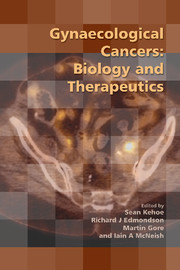Book contents
- Frontmatter
- Contents
- Participants
- Declarations of personal interest
- Preface
- SECTION 1 BIOLOGY OF GYNAECOLOGICAL CANCERS: OUR CURRENT UNDERSTANDING
- SECTION 2 THE TRANSLATION OF BIOLOGY TO THE CLINIC
- SECTION 3 IMAGING AND THERAPY: STATE OF THE ART
- 8 The role of robotics and the future
- 9 ‘Ultra-radical’ surgery in advanced ovarian cancer
- 10 Antivascular therapy in gynaecological cancers
- 11 Oncolytic viral gene therapy in ovarian cancer
- 12 Endometrial cancer: what have the clinical trials taught us?
- 13 Targeting therapies in cancer: opportunities in ovarian cancer
- 14 Functional imaging: from tumour biology to the clinic
- SECTION 4 WHAT QUESTIONS ARE BEING ASKED BY CURRENT CLINICAL TRIALS?
- SECTION 5 CONSENSUS VIEWS
- Index
11 - Oncolytic viral gene therapy in ovarian cancer
from SECTION 3 - IMAGING AND THERAPY: STATE OF THE ART
Published online by Cambridge University Press: 05 February 2014
- Frontmatter
- Contents
- Participants
- Declarations of personal interest
- Preface
- SECTION 1 BIOLOGY OF GYNAECOLOGICAL CANCERS: OUR CURRENT UNDERSTANDING
- SECTION 2 THE TRANSLATION OF BIOLOGY TO THE CLINIC
- SECTION 3 IMAGING AND THERAPY: STATE OF THE ART
- 8 The role of robotics and the future
- 9 ‘Ultra-radical’ surgery in advanced ovarian cancer
- 10 Antivascular therapy in gynaecological cancers
- 11 Oncolytic viral gene therapy in ovarian cancer
- 12 Endometrial cancer: what have the clinical trials taught us?
- 13 Targeting therapies in cancer: opportunities in ovarian cancer
- 14 Functional imaging: from tumour biology to the clinic
- SECTION 4 WHAT QUESTIONS ARE BEING ASKED BY CURRENT CLINICAL TRIALS?
- SECTION 5 CONSENSUS VIEWS
- Index
Summary
Introduction
Oncolytic viruses are a novel treatment for cancer. These agents infect cancer cells and replicate selectively within them, causing death with release of mature virions that can subsequently infect neighbouring cells. A series of viruses have been developed and are being taken towards clinical trials in women with relapsed ovarian cancer. However, the majority of data derive from research on adenoviruses. In this chapter, I review the biology of adenoviruses, clinical trials of oncolytic viral gene therapy in ovarian cancer and recent developments that may give cause for cautious optimism.
DNA viruses and cancer
Successful completion ofany DNA virus life cycle requires the virus to overcome many cellular pathways and checkpoints in order to permit replication of the viral DNA and generation of new virions. Many of the pathways targeted by DNA viruses are the same as those deregulated in cancer and it is this overlap between virus and cancer biology that makes replicating viruses potential treatments for human malignancy.
The first description of viruses as anti-cancer agents came over 100 years ago and, in 1953, a clinical trial to investigate the therapeutic potential of adenoviruses was conducted in women with cervical cancer and some short-lived responses were seen. More recently, there have been anecdotal descriptions of lymphoma regressing following measles infection.
Keywords
- Type
- Chapter
- Information
- Gynaecological CancersBiology and Therapeutics, pp. 139 - 152Publisher: Cambridge University PressPrint publication year: 2011



